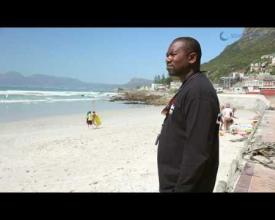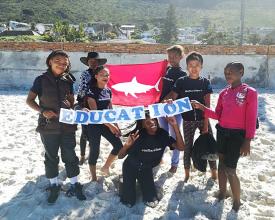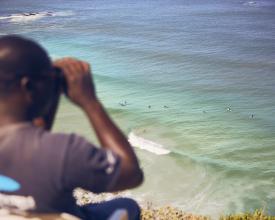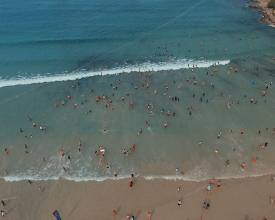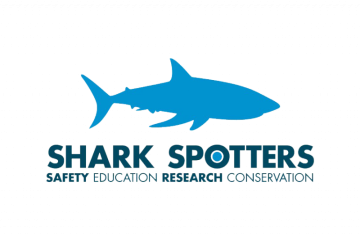
SHARK SPOTTERS - sustainable coexistence of sharks and people in our oceans
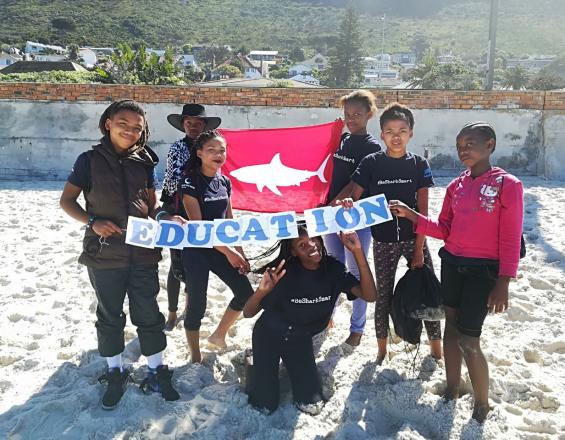
Shark Spotters (est.2004) is a pioneering shark-safety program that has attracted local and international attention because of the novel way it seeks to reduce conflicts between people and sharks in Cape Town. Shark Spotters finds a balance between recreational water-user safety and white shark conservation through pro-actively reducing negative shark-human interactions, by using spotters and an exclusion barrier.
We also conduct applied research on shark ecology and behaviour, raise awareness about shark conservation issues, conduct proactive and reactive coastal conservation interventions and provide employment opportunities and skills development for previously disadvantaged individuals.
Shark Spotters is a unique, socially and environmentally responsible initiative that protects beach tourism, the local economy and the environment from the negative repercussions of shark bite incidents as well as actively conserving and rehabilitating our marine environment from human-induced impacts.
Context
Challenges addressed
Tourism and local businesses suffer as people no longer wish to partake in recreational water activities and so visitor numbers to beaches drop. To mitigate these effects, governments respond to shark bites with knee-jerk reactions, implementing extreme measures including lethal control of sharks. These measures are not sustainable and can have serious detrimental environmental effects, especially those which impact threatened or vulnerable species, such as great white sharks.
Shark Spotters sustainable, non-lethal shark safety strategies effectively reduce the risk of shark bite without resorting to lethal control. Thus protecting and strengthening communities, local economies and tourism, reducing risk of injury and death of water users, as well as conserving sharks, important apex predators, and other marine megafauna that would be impacted should we use lethal control.
Location
Process
Summary of the process
We believe that to achieve sustainable conservation, humans and the environment need to be considered together.
Our primary mandate is beach safety, but this is not a stand-alone solution to reducing human-shark conflict. Applied research is necessary to understand the role these top predators play in our ecosystems and how their distribution is influenced by environmental & biological factors, in order to devise effective public safety policy.
Education & awareness is important as it increases peoples understanding of sharks so that they are motivated to conserve them by realising the important role they play in ecosystem function and resilience. Teaching people ways in which they can avoid shark encounters improves water user safety and reduces the likelihood of communities suffering from the negative impacts of shark bites.
Lastly, mitigating human impacts on our coastline directly benefits the conservation of sharks and other marine animals as it is improves ocean health and reverses some of the damage done to our fragile marine ecosystem already.
Thus Shark Spotters takes a holistic approach to reducing shark-human conflict, combining all four building blocks to increase its impact.
Building Blocks
Sustainable shark safety services
Shark spotting is a proactive, early-warning shark-safety service provided at 8 strategic beaches around Cape Town where there is a high spatial overlap between people and sharks. It uses continuous visual surveillance by trained observers (spotters) to detect sharks and prevent negative interactions between sharks and recreational water-users.
Spotters scan the water looking for sharks using polarized sunglasses and binoculars. When a shark is seen a siren is sounded and flag is raised, signaling to water users to leave the water and only return when the appropriate all clear signal is given. Shark Spotters uses a system of four informative flags on every beach to communicate the current shark status and spotting conditions to the public.
With over 3,000 shark sightings recorded by the program since its inception, Shark Spotters has significantly reduced the risk of shark bite at our operating beaches, providing safer swimming and surfing areas for visitors and locals alike.
Enabling factors
Shark Spotting requires a significant elevation adjacent to the beach, in order to be effective.
It also requires strong partnerships with local authorities for the implementation of the programme, and support from conservation minded individuals in both government and the communities who are willing to explore sustainable alternatives to lethal control.
Lesson learned
Transparent, open, non-sensational communication around shark risk and ways in which people can reduce the risk of encountering a shark is essential. Counteracting sensationalist reporting and fear-mongering is an important part of any shark safety strategy.
Importance of community buy-in to the programme. Shark Spotters started as a community initiative, which is key to its success. The steering committee is representative of the local community and has local business representatives, ensuring that the organisation is always providing the best and most appropriate service to the community.
Resources
Applied Research
Our ground-breaking applied research is focused on shark presence and behavioural ecology in Cape Town to inform public safety policy, conservation and management strategies and education and awareness. We drive an adaptive management approach to human-shark conflict which is responsive to conflict and proactive in using research and best practices. Shark Spotters also collates shark bite information and respond to all local incidents to collect factual and objective information.
We have published our results in multiple peer-reviewed journals (see attached) and presented at numerous scientific conferences.
Following the covid-19 pandemic, it has become even more imperative that we understand the negative impacts we are having on our environment to mitigate these timeously before they escalate into large, global issues. Our research focus is therefore shifting to not only understand the behaviour and distribution of sharks in our bay, but also to look at the role they play in maintaining ecosystem structure and resilience, and how human impacts, as well as environmental changes, influence this. We can then target our conservation strategies to ensure that the marine environment can continue to provide important ecosystem services that will help protect us from future pandemics or environmental disasters.
Enabling factors
Strong partnerships with academic institutions to ensure rigourous scientific protocols and procedures are followed.
Adequate funding for long term ecological monitoring.
Adaptive management approach - focusing on areas lacking adequate information and ensuring research priorities are relevant to a changing and dynamic ocean ecosystem as well as changing human needs.
Lesson learned
The importance of disseminating information as quickly as possible, both for the conservation of threatened apex predators as well as for inclusion in public safety protocols and management.
The need for inter-disciplinary research and collaboration to understand the multiple interrelated aspects of marine ecology and conservation, and in order to identify issues and find solutions timeously.
Environmental Education and Awareness
Education & awareness is key to a successful shark-safety strategy and we work hard to provide factual, non-sensational information about shark-safety to visitors to our beaches so that they can make informed decisions about risk when entering the water. We also aim to foster a greater understanding of sharks and their important role in the ecosystem in order to change people’s perspective of sharks, from fear to acceptance.
Our Info Centre serves as an interactive space for the public to connect with the program and access information about sharks and marine conservation, seeing thousands of local and international visitors every year. We also perform numerous educational outreach activities in our surrounding communities, reaching +/- 3,000 participants directly and many thousands more through festivals and exhibitions we participate in. We have developed a marine safety and conservation education program for all ages, from pre-primary to University level, with many aspects aligned with the South African CAPS curriculum.
Our unique mobile app provides real time shark-safety information and other beach conditions for all our operating beaches. This is an invaluable tool for visitors to the area to ensure they have the most up to date information about shark risk before visiting the coast.
Enabling factors
Buy in from local education facilities and communities to empower their students and citizens to learn more about responsible ocean use.
Engaging content that instills new values in learners and allows them to make changes to their daily activities to minimise harm to the ocean.
Strong relationships with local media to disseminate information and change the narrative from sensational to more reasoned discourse around shark bite incidents.
Lesson learned
Need to be adaptable to changing circumstances (e.g., coronavirus pandemic limiting "in-person" interventions).
The need for buy-in from the private sector to fund education initiatives as part of their corporate social investment initiatives.
The need for training in conflict-resolution to manage polarising views and get the message across in a form that does not exclude certain sectors. For example, managing the complex balance between keeping surfers and swimmers safe from sharks and potentially scaring them away from the beach, or significantly impacting their recreation time, resulting in negative sentiments to the programme or sharks. Also, dealing with different user groups that have conflicting views on the need to protect sharks, like fishermen and bathers.
The importance of environmental education in empowering people through greater understanding to encourage behaviour change and active participation in conservation efforts.
Resources
Coastal and Marine Conservation
In 2019, Shark Spotters identified the need for more practical interventions to conserve our coastline from human impacts, and therefore started a “Coastal Conservation Team”, working in partnership with the City of Cape Town to conduct proactive and reactive conservation activities that make a significant positive impact on the coastal environment. These include sand dune stabilisation and rehabilitation, removal of ghost fishing gear, vessel waste and other pollution from the coastal zone, management of stormwater outlets at the beach interface to reduce land-based pollution entering the sea, repair and removal of damaged coastal infrastructure after swell/storm damage, ocean water quality testing, responding to stranded animals and more. Their presence ensures our coastal habitat is protected from human degradation as well as the effects of climate change, and that our oceans remain healthy for sharks and other marine creatures.
During the recent pandemic, we found more and more people using the coastal zone as it was often the only "safe" exercise and recreation area. This saw an increase in pollution and other human impacts on the coast and highlighted the need for more awareness around the importance of active citizenship in protecting these areas that provide so much economic and social value to communities.
Enabling factors
Partnerships with local authorities and identifying areas where local authorities do not have the capacity to implement practical solutions to coastal degradation issues.
Competent coastal ecology experts to guide effective conservation solutions.
Lesson learned
The need for adequate tools and equipment to complete the tasks.
The need for flexible and rapid response to coastal emergencies as they arise.
The importance of a "last line of defence" to mitigate human impacts on the marine - terrestrial interface.
The publicising of these interventions so that people are aware of their impacts on the oceans and how responsible environmental behaviour on land can reduce detrimental effects caused to the oceans.
Impacts
Shark Spotters has sucessfully reduced the spatial overlap between people and sharks in Cape Town since 2004, recording over 3,000 shark sightings and significantly improving bather safety. This success was corroborated by a 2017 study that showed its effectiveness in mitigating shark risk.
By providing an effective and sustainable alternative to lethal shark control we have therefore conserved threatened marine megafauna within the Table Mountain National Park MPA.
Shark Spotters is internationally recognised as a pioneer and leader in non-lethal shark mitigation and continues to provide consulting and advisory services to stakeholders in shark conflict areas around the world (e.g. Australia, Reunion, United States). Many of our recommendations have been implemented in these areas.
Through our longstanding education activities, we have changed peoples perceptions of sharks, from fear to understanding, and were instrumental in the global shift from traditional lethal control towards more sustainable shark safety solutions.
The programme’s philosophy of a holistic non-lethal approach to finding a balance between people and sharks should be emulated in other high shark risk areas. This is especially important in a post-covid world where the disconnect between people and nature and the negative consequences of environmental destruction has never been more apparent.
Beneficiaries
Beneficiaries include the 40 staff employed by the program, the millions of recreational waterusers (and associated beach-based businesses) protected by our safety services, and the local communities targeted by our “responsible ocean use” education programme.
Sustainable Development Goals
Story
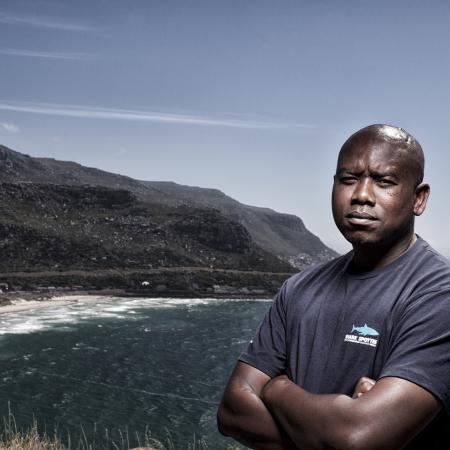
Monwabisi Sikweyiya was the very first shark spotter employed by the programme back in 2004. After a spate of shark bites in the area, the community came together to look for solutions to protect beachfront businesses and communities from the negative impacts of shark attacks. Monwa was placed at a lookout on the mountain with polarised sunglasses and binoculars and tasked with determining if shark spotting was possible and to determine how effective it would be. Under Monwa's watchful eye, a dramatic change in the way people perceived sharks unfolded in Cape Town. With the information gained from many shark sightings, and the experience learnt from spending hundreds of hours on the mountain, Monwa was able to turn people's fears of sharks into understanding, and by providing an effective early-warning safety service, the community embraced this sustainable solution rather than pushing for lethal control of sharks, which was previously the case.
Monwa has spotted hundreds of sharks in his time, significantly improving beach safety in our area. In addition, the skills that he has learnt, most specifically in first aid and major trauma response, have been put to good use, both saving the life of a shark-bite victim in 2011, as well as many instances of non-shark related injuries such as heart attacks and surfboard injuries on the beach.
Monwa has grown with the programme and is now the Field Manager, responsible for ensuring water user safety on all our operating beaches. He has also been to Australia to represent Shark Spotters and provide sustainable shark safety advice there, and has become a true ambassador of our oceans, making a tangible impact on beach safety and marine conservation on a daily basis.
This is a shining example of how investing in local community members has immeasurable benefits for shark conservation, the local economy and individual success and empowerment. It also demonstrates the value in creating sustainable employment opportunities in the blue economy, where both people and the oceans benefit, which is particularly important in a post-pandemic environment, where we need to build back our economies in a more sustainable and less environmentally destructive manner.
